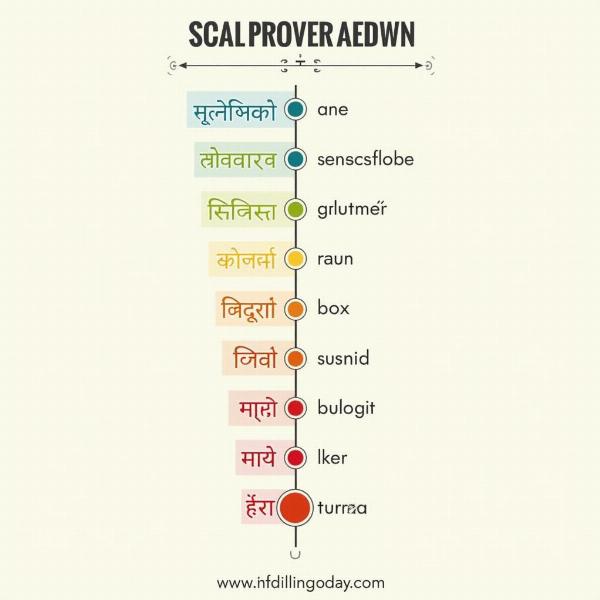Understanding the meaning of “unpleasant” in Hindi is crucial for effective communication and cultural sensitivity. The word “unpleasant” describes something that is not enjoyable or causes discomfort. It encompasses a range of negative experiences, from mild dislike to strong aversion. Knowing how to express this concept accurately in Hindi allows for nuanced conversations and a deeper understanding of Indian perspectives.
Exploring Hindi Translations for “Unpleasant”
There isn’t one single perfect translation for “unpleasant” in Hindi, as the best choice depends on the specific context. Several words and phrases capture different shades of meaning, offering a rich vocabulary to express varying degrees of unpleasantness.
Common Hindi Words for “Unpleasant”
- अप्रिय (apriya): This is perhaps the most common and direct translation of “unpleasant.” It signifies something disagreeable or undesirable. Use “apriya” in general contexts where you want to express a simple dislike or disapproval.
- अरुचिकर (aruchikar): This word emphasizes a lack of interest or appeal. It’s often used for things that are boring, tasteless, or unattractive. “Aruchikar” is suitable when describing something that fails to pique your interest.
- बुरा (bura): Meaning “bad,” “bura” can also convey unpleasantness, especially when referring to a negative experience or a bad quality. It carries a stronger connotation than “apriya.”
- ख़राब (kharab): Similar to “bura,” “kharab” means “bad” or “spoiled.” It’s often used for things that are damaged, faulty, or of poor quality. “Kharab” can imply a more tangible form of unpleasantness.
- नापसंद (napasand): This word directly translates to “disliked” or “not liked.” It expresses a personal aversion or preference against something. “Napasand” is appropriate when expressing a personal dislike.
Contextual Usage and Examples
Consider these examples to understand the nuances of each word:
- अप्रिय अनुभव (apriya anubhav): An unpleasant experience.
- अरुचिकर भोजन (aruchikar bhojan): Unpleasant (unappetizing) food.
- बुरा सपना (bura sapna): A bad (unpleasant) dream.
- ख़राब मौसम (kharab mausam): Bad (unpleasant) weather.
- नापसंद व्यवहार (napasand vyavhar): Unpleasant (disliked) behavior.
Expressing Degrees of Unpleasantness in Hindi
Hindi offers various ways to intensify or soften the expression of unpleasantness. You can use adverbs and adjectives to modify the core words and create a more precise meaning.
Intensifying Unpleasantness
Words like बहुत (bahut – very), अत्यंत (atyant – extremely), कष्टदायक (kashtdayak – painful), भयानक (bhayankar – terrible) can amplify the sense of unpleasantness.
- बहुत बुरा (bahut bura): Very bad/unpleasant.
- अत्यंत अप्रिय (atyant apriya): Extremely unpleasant.
Softening Unpleasantness
To express mild displeasure, you can use words like थोड़ा (thoda – a little), कुछ (kuch – some), ज़रा (zara – slightly).
- थोड़ा नापसंद (thoda napasand): Slightly disliked/unpleasant.
- कुछ अप्रिय (kuch apriya): Somewhat unpleasant.
 Degrees of Unpleasantness in Hindi
Degrees of Unpleasantness in Hindi
Unpleasantness in Indian Culture
Understanding the cultural context is essential when using these words. Indian culture often prioritizes politeness and avoiding direct confrontation. Therefore, expressing displeasure might be done more subtly than in other cultures.
Dr. Anjali Sharma, a linguist specializing in Hindi, explains, “Indians often use indirect language to convey negative feelings. Instead of saying something is ‘bad,’ they might say it’s ‘not so good’ to soften the impact.”
Conclusion
Knowing how to express “unpleasant” in Hindi accurately enriches communication and demonstrates cultural sensitivity. Using the appropriate word or phrase in the right context ensures clear understanding and avoids misinterpretation. By mastering these nuances, you can navigate conversations with greater confidence and build stronger relationships with Hindi speakers.
FAQ
- What is the most common Hindi word for “unpleasant”? अप्रिय (apriya) is generally the most common and direct translation.
- How do I express strong displeasure in Hindi? Use intensifying adverbs like बहुत (bahut) or अत्यंत (atyant) with words like bura or apriya.
- Is it considered rude to express displeasure in India? While expressing displeasure is acceptable, it’s often done more indirectly to maintain politeness.
- What are some other ways to say “unpleasant” in Hindi besides apriya? Other options include aruchikar, bura, kharab, and napasand.
- How do I choose the right word for “unpleasant” in Hindi? Consider the specific context and the nuance you want to convey.
Meaning-Hindi.in offers professional translation services specializing in Hindi and various other languages. Our expertise encompasses business, legal, technical, website localization, educational, and specialized translations, including expedited services. We ensure accurate and culturally sensitive translations for all your needs. Contact us at [email protected] or call us at +91 11-4502-7584. Meaning-Hindi.in is your trusted partner for bridging language barriers.